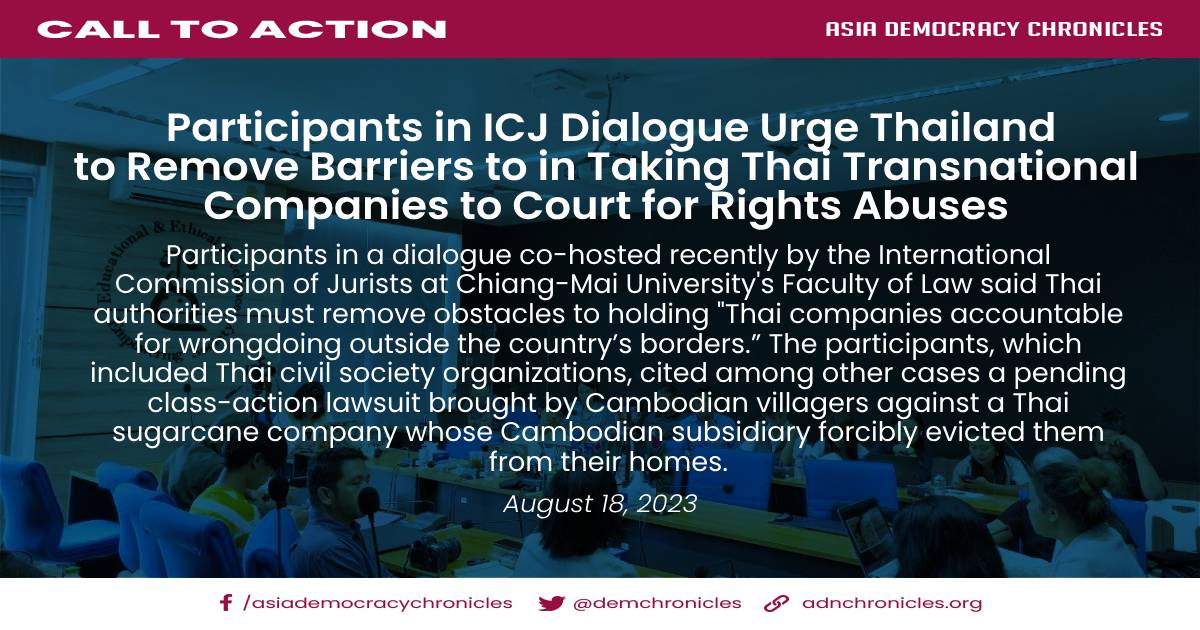|
Getting your Trinity Audio player ready...
|
18 August 2023
“The Thai authorities must act to remove obstacles to holding Thai companies accountable for wrongdoing outside the country’s borders,” urged participants at a dialogue co-hosted by the International Commission of Jurists (ICJ) on 8 June 2023 at Chiang Mai University’s Faculty of Law.
Approximately 60 interested individuals and members of civil society organizations from Thailand and neighboring countries attended the dialogue, both in person and online. The dialogue was broadcast simultaneously through various channels including the online news outlet Prachatai Facebook page.
The dialogue recalled Thailand’s international legal obligations to protect human rights not only within its territory but also, to some extent, extraterritorially. Participants note that all State agencies are subject to these obligations, encompassing not only the executive and legislative branches, but also the judiciary.
“It is now past time for responsible Thai executive, legislative and judicial authorities to act to amend the country’s laws, policies and practices, paving the way for individuals affected by human rights abuses committed by Thai corporations abroad to seek justice in Thai courts.”, said Sanhawan Srisod, ICJ Associate International Legal Adviser.
“Jurisdiction regarding such claims should no longer be limited to the courts of the States where the abuse occurred. It should explicitly extend to Thai courts if the acts or omissions contributing to the abuse occurred in Thailand or if Thailand is the country where the corporations or the victims are domiciled, especially in cases where the remedies available to victims before the domestic courts of the state where the harm occurs are unavailable or ineffective,” Srisod added.
The dialogue further discussed attempts to bring cases related to human rights abuses involving Thai transnational corporations abroad that have been brought to Thai courts.
Sor.Rattanamanee Polkla, lawyer and executive coordinator of the Community Resource Centre Foundation, described challenges faced in cases she represented. These included an unsuccessful lawsuit brought by Thai villagers against Thai governmental agencies regarding the construction of the Xayaburi Dam in Lao PDR and its transboundary environmental destruction affecting communities in Thailand. Additionally, there is a pending class-action lawsuit brought by Cambodian villagers against a Thai sugarcane company, alleging its subsidiary in Cambodia forcibly evicted them from their homes.
The limitations identified encompass the legal nature of corporations, evidentiary challenges, conflict of laws, and statutes of limitation.
Participants also discussed international human rights law and standards governing the conduct of transnational business activities, such as the UN Guiding Principles on Business and Human Rights, UN human rights treaties, and international environmental law. Observations on the relationship between these laws and their domestic implementation were provided by Marcos Orellana, Special Rapporteur on toxics and human rights, and Pichamon Yeophantong, Chairperson of the UN Working Group on Business and Human Rights.
Nareeluc Pairchaiyapoom, Director of International Human Rights Division at Thailand’s Ministry of Justice (MOJ), shared steps taken by the Thai government in addressing these issues, including designating ‘cross-border investment and multi-national enterprises’ as a key priority issue in Thailand’s National Action Plan on Business and Human Rights.
On 25 July 2023, the Thai Cabinet passed a resolution to adopt the Second NAP (2023-2027), which encompasses an action point for the Ministry of Justice to propose amendments aimed at ensuring access to justice and providing effective remedy for affected communities, both local and overseas. Nevertheless, according to the MOJ, the Second NAP is not yet finalized and is subject to amendments in response to comments made by the Cabinet.
The dialogue concluded with recommendations from the independent researcher on responsible business practices, Sarinee Achavanuntakul. Among other points, she stressed the importance of raising corporate awareness about National Action Plans and UNGPs, highlighting the importance of the implementation of human rights due diligence.
The dialogue was co-hosted by the Legal Research and Development Center, Chiang Mai University’s Faculty of Law; EarthRights International; Community Resources Center Foundation; ETO Watch Coalition; and ENLAW Thai Foundation.
Source: https://www.icj.org/thailand-legal-and-practical-barriers-frustrate-access-to-effective-remedies-for-human-rights-abuses-involving-thai-transnational-corporations-abroad/



















